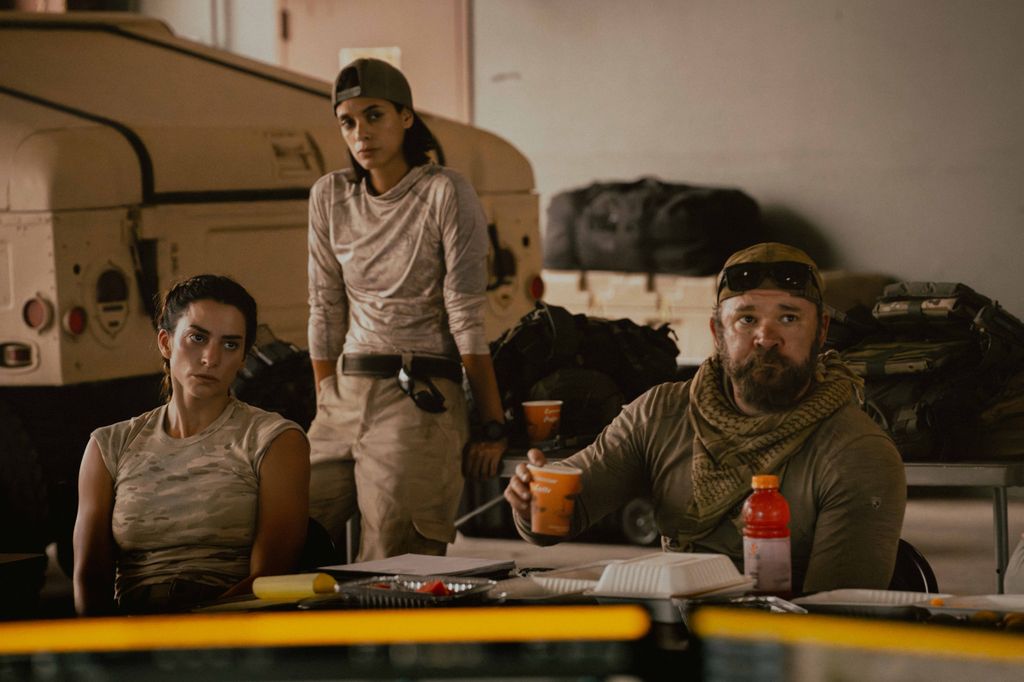LOS ANGELES – In the shadow of a drone’s silent hum over sun-baked deserts, where alliances shatter like glass under boot heels and family dinners erupt into accusations sharper than switchblades, Lioness prowls onto screens like a predator that’s been caged too long. Forget the tuxedoed martini sips of James Bond; Taylor Sheridan’s explosive eight-episode thriller on Paramount+ detonates the spy genre with a female-led ferocity that’s equal parts adrenaline rush and emotional gut-punch. Starring Zoe Saldaña as the steely CIA operative Joe and Nicole Kidman as her enigmatic superior Kaitlyn Meade, the series isn’t just a mission briefing—it’s a declaration of war on the boys’ club of espionage, blending high-octane covert ops with the raw, ranch-style family tensions that Sheridan fans know all too well from Yellowstone. As Season 3 gears up for production, Lioness isn’t whispering secrets; it’s roaring them from the rooftops, leaving viewers breathless, betrayed, and begging for more.
From its blistering premiere in July 2023, Lioness—initially billed as Special Ops: Lioness—has clawed its way into the cultural conversation, amassing a devoted following that binge-watches episodes like they’re classified intel drops. Inspired by the real-life CIA program that deployed female soldiers to navigate the cultural minefields of the War on Terror, the show reimagines those all-too-real patrols as a high-stakes game of infiltration and illusion. At its core, Lioness follows the titular program: an elite cadre of women operatives, dubbed Lionesses, who slip into the intimate spheres of terror networks—befriending wives, seducing daughters, whispering doubts into the ears of the overlooked. It’s a premise that’s brutally efficient, turning the gendered blind spots of global conflict into weapons of precision.
Zoe Saldaña’s Joe is the beating heart of this machine, a senior case officer whose life is a taut wire between the battlefield and the breakfast table. Saldaña, fresh off commanding blue-skinned Na’vi warriors in Avatar: The Way of Water, trades Pandora’s lush jungles for the arid kill zones of the Middle East and the sterile glow of Langley briefings. Joe’s not just a handler; she’s a hurricane in fatigues—fiercely protective of her recruits, haunted by the ghosts of missions gone wrong, and unraveling at home where her teenage daughter eyes her with the sullen judgment only a 16-year-old can muster. In one gut-wrenching sequence from Season 1, Joe returns from a botched op, blood still caked under her nails, only to face her husband’s quiet plea for normalcy over reheated lasagna. “You smell like sand and secrets,” he says, and Saldaña’s flinch—subtle, seismic—captures the toll of a life where love is collateral damage.
Towering over it all is Nicole Kidman as Kaitlyn Meade, the CIA’s iron-fisted deputy director whose Botox-smooth facade cracks just enough to reveal a woman who’s traded her soul for the greater good. Kidman, an executive producer alongside Saldaña, brings her signature chill to Kaitlyn: a predator in pearls who navigates Oval Office power plays with the grace of a scalpel. In Season 2’s opener, Kaitlyn stares down Secretary of State Edwin Mullins (Morgan Freeman, chewing scenery like it’s his last meal) over a botched drone strike, her voice a velvet blade: “We don’t save the world by playing nice, Edwin. We save it by playing God.” It’s Kidman at her most magnetic—vulnerable in private, where a single tear betrays the cost of her ambition, yet unbreakable in the war room. Critics have whispered about her “frozen face” distracting from the drama, but in Lioness, it’s a feature, not a bug: Kaitlyn’s impassivity is her armor, forged in the fires of too many compromises.
The ensemble pulses with undercurrents of betrayal and bravado. Laysla De Oliveira bursts onto the scene as Cruz Manuelos, the fiery Marine recruit whose street-smart grit makes her the perfect pawn—or queen—in Joe’s chess game. Cruz’s arc in Season 1, infiltrating the inner circle of a billionaire terror financier by posing as a luxury concierge to his jet-setting daughter (Stephanie Nur, all wide-eyed privilege laced with menace), is a masterclass in slow-burn suspense. De Oliveira’s Cruz isn’t a damsel; she’s a dagger, stripping naked for a contrived polygraph in one episode not for titillation, but to underscore the dehumanizing calculus of cover. Supporting the fray are Michael Kelly as the chain-smoking Deputy Director Byron Westfield, a chain-smoking skeptic who grounds the show’s moral ambiguities; Genesis Rodriguez as the tech-savvy Josie Carrillo, whose drone feeds reveal horrors that haunt her sleep; and Jill Wagner as the no-nonsense Two, whose banter with the team crackles like live wire.

Sheridan’s fingerprints are everywhere, from the sweeping cinematography that turns Moroccan souks into labyrinths of deceit to the dialogue that snaps like a rifle bolt. “Homeland on steroids,” one insider quipped during production, and it’s spot-on: where Showtime’s Carrie Mathison spiraled into manic brilliance, Lioness unleashes a pride of Lionesses who operate with cold calculus and hot rage. The action sequences are visceral poetry—hand-to-hand takedowns in moonlit compounds, where sweat and sand mix with the copper tang of blood; high-speed chases through Dubai’s glittering veins that end in alleyway executions. But Sheridan’s true genius lies in the domestic detonations: Joe’s family dinners devolve into interrogations, Kaitlyn’s marriage frays under the weight of unspoken ops, and Cruz’s flashbacks to a Chicago upbringing scarred by loss mirror the recruits’ fractured psyches. It’s Yellowstone tension transplanted to the shadows of Langley—ranch rivalries swapped for terror cells, but the stakes of loyalty and legacy feel just as primal.
Season 1, spanning eight taut hours, kicks off with a drone strike that vaporizes a female operative mid-infiltration, setting the tone for a world where heroism is measured in body counts and betrayals. Joe’s task: groom a new Lioness to befriend Aaliyah, the Oxford-educated daughter of Asmar Ali Amrohi (Thad Luckinbill, slimy as oil), a shadowy financier funneling millions to jihadists. The mission spirals into a web of double-crosses—Cruz’s cover nearly blows during a yacht party ambush, Kaitlyn greenlights a risky asset flip that endangers her own protégé—and personal reckonings. By the finale, alliances shatter, a key player falls, and the screen fades on Joe’s haunted gaze, whispering, “We don’t get to choose the war. We choose how we fight it.” Viewership surged 40% week-over-week, with Paramount+ reporting it as their most-watched original drama debut since 1883.
Season 2, dropping in October 2024, amps the stakes into overdrive. Joe’s team now hunts a rogue network smuggling bioweapons through European refugee pipelines, forcing Kaitlyn into uneasy bedfellows with Interpol and a rogue ex-KGB asset (newcomer Thaddea Graham, all ice and fire). Saldaña’s Joe grapples with PTSD-fueled blackouts that bleed into her home life—her daughter’s prom night interrupted by a frantic Langley callback—while Kidman’s Kaitlyn faces a Senate inquiry that peels back layers of her ruthless climb. Freeman’s Mullins evolves from avuncular overseer to a hawkish force pushing for escalation, his Oval Office monologues on “the cost of freedom” landing like thunderclaps. The season’s midpoint twist—a Lioness turned double agent—ignites a firestorm of paranoia, culminating in a Rome siege that’s equal parts Bourne brutality and The Americans heartache. Critics hailed it as “a bolder beast,” with Season 2’s 90% Rotten Tomatoes score eclipsing the first’s 56%, praising deeper character dives and fewer pacing hiccups.
As of November 2025, Lioness roars louder than ever with Season 3 greenlit and cameras rolling in New Mexico’s sun-scorched badlands. Saldaña, pausing mid-filming to cheer on her Dominican roots via a viral X video, hints at Joe’s arc plunging into cyber-terror realms, where Lionesses hack deepfakes to dismantle a global misinformation cabal. Kidman teases Kaitlyn’s “reckoning,” a divorce subplot that forces her to confront the voids she’s filled with classified files. New blood joins the pride: rumors swirl of a Yellowstone crossover with a Beth Dutton-esque operative, though Sheridan demurs, “Family feuds stay in Montana—for now.” Freeman’s Mullins ascends to a more pivotal role, brokering fragile truces amid escalating U.S.-Russia tensions.
Fan frenzy on X (formerly Twitter) has turned Lioness into a digital pride land. Hashtags like #LionessS3 and #WomenInTheShadows trend weekly, with threads dissecting Cruz’s redemption arc (“De Oliveira’s got that Fury Road fire!”) and Kaitlyn’s wardrobe as “power suits for the apocalypse.” Binge-watch parties spike during drops, and fan art floods feeds—Joe as a cybernetic panther, Kaitlyn’s silhouette against a blood moon. “It’s addictive AF,” one viral post raves, racking up 50K likes. “Saldaña and Kidman don’t just lead; they devour the screen.” Detractors gripe about “propaganda polish” and “one-note villains,” but even they admit the pull: in a genre bloated with reboots, Lioness feels feral, fresh.
What elevates Lioness beyond genre thrills is its unflinching gaze at the women behind the weapons. These aren’t Bond girls with gadgets; they’re mothers memorizing kill lists, wives forging alibis over FaceTime, daughters inheriting their mothers’ scars. Sheridan, often critiqued for his alpha-male archetypes, here cedes the narrative to his Lionesses, letting their vulnerabilities fuel the fury. Saldaña’s post-premiere interview captured it: “Joe’s not unbreakable. She’s broken beautifully, piecing herself back with every mission.” Kidman echoes, “Kaitlyn’s the queen who eats her own—until she realizes the throne’s lonely.”
In a landscape where spies sip shaken-not-stirred elixirs, Lioness serves grit and gunpowder. Brutal in its betrayals, bold in its bloodshed, it’s the thriller that doesn’t just hook you—it sinks claws deep. As Season 3 looms, one thing’s clear: Joe and Kaitlyn aren’t saving the world. They’re reshaping it, one covert kiss at a time. Stream it on Paramount+—but brace yourself. This pride doesn’t play.





